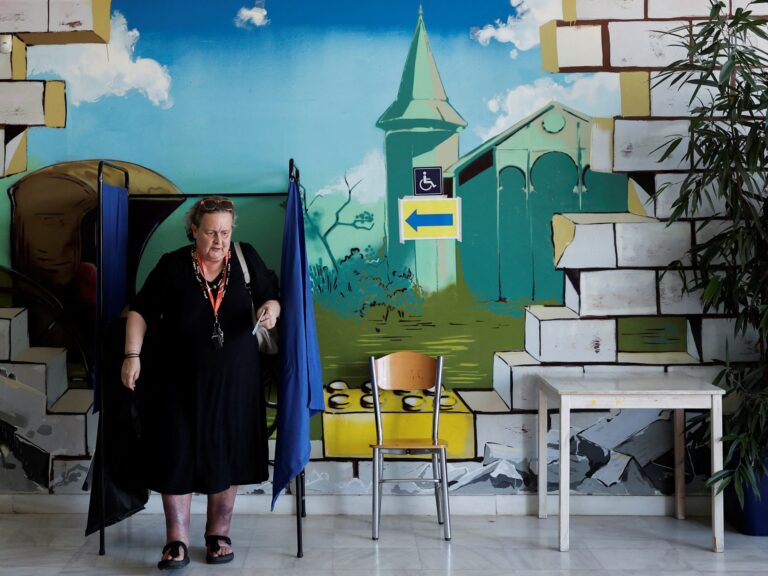The elections will determine how the European bloc faces challenges such as a hostile Russia, increased industrial rivalry with China and the United States, climate change and immigration.
Voters in 20 European Union countries have begun choosing the bloc’s next parliament, fearing that a a likely shift to the political right It will undermine the ability of the world’s largest trading bloc to make decisions as war rages in Ukraine and anti-migrant sentiment rises.
Elections began on Thursday in the Netherlands and other countries Friday and Saturday, but the bulk of EU voting will take place on Sunday, with France, Germany, Poland and Spain opening polling stations and Italy holding a second day of voting to elect 720 members of the EU. European Parliament.
Assembly seats are allocated based on population, ranging from six in Malta and Luxembourg to 96 in Germany.
The elections will determine how the European bloc faces challenges such as a hostile Russia, increased industrial rivalry with China and the United States, climate change and immigration.
An unofficial exit poll released Thursday suggests that Geert Wilders’ far-right, anti-migrant party is likely to make significant progress in the Netherlands, although a coalition of pro-European parties likely propelled it to second place.
Since the last European elections in 2019, populist or far-right parties now lead the governments of three countries – Hungary, Slovakia and Italy – and are part of the ruling coalition in others, notably Sweden , in Finland and, soon, in Sweden. the Netherlands. Polls give the advantage to populists in France, Belgium, Austria and Italy.
The elections come at a time when voter confidence in a bloc of some 450 million people is being tested. Over the past five years, the EU has been rocked by the coronavirus pandemic, an economic crisis and an energy crisis fueled by the war in Ukraine – Europe’s largest land conflict since World War II.
The polls also mark the start of a period of uncertainty for Europeans and their international partners. Beyond the quarrels to form political groups and establish alliances within parliament, governments will compete to guarantee the best European positions for their national civil servants.
At the forefront of these is the presidency of the powerful executive branch, the European Commission, which proposes laws and ensures their compliance. The Commission also controls the EU’s purse strings, manages trade and is Europe’s competition watchdog.
Other prestigious positions are president of the European Council, who chairs summits of presidents and prime ministers, and EU foreign policy chief, the bloc’s top diplomat.
European lawmakers have a say on legislation ranging from financial rules to climate or agricultural policy. They also approve the EU budget which, in addition to financing the bloc’s political priorities, finances infrastructure projects, agricultural subsidies and aid to Ukraine.
But despite their important role, political campaigns often focus on issues of individual country concern rather than broader European interests. Voters regularly use their ballots to protest the policies of their national government.
Surveys suggest that traditional and pro-European parties will retain their majority in parliament, but that the hard right, including parties led by politicians like Wilders or France’s Marine Le Pen, will eat into their share of seats.
The largest political group – the center-right European People’s Party (EPP) – has already strayed from the middle ground, campaigning on traditional far-right issues like more security, stricter immigration laws and a focus on business rather than social welfare concerns.
Much could depend on whether the Brothers of Italy – the ruling party of far-right populist Prime Minister Giorgia Meloni, with neofascist roots – will remain in the hardest line of the European Conservatives and Reformists (ECR ), or whether they will fit into a new tough group. A right-wing group that could be created following the elections. Meloni also has the opportunity to work with the EPP.
The second largest group – the center-left Socialists and Democrats – and the Greens refuse to align with the ECR group. A more disastrous scenario for pro-European parties would be for the ECR to join forces with Le Pen’s Identity and Democracy to consolidate the influence of the far right.
Questions remain about which group Hungarian Prime Minister Viktor Orban’s staunchly nationalist and anti-migrant Fidesz party might join. He was previously part of the EPP, but was forced out in 2021 due to conflicts over his interests and values.
The EPP campaigned for Ursula von der Leyen to get a second term as commission president, but there is no guarantee she will be re-elected even if she wins. National leaders will decide who is nominated, although Parliament must approve any nomination.


